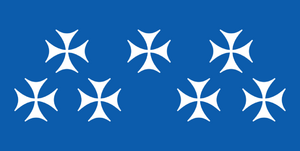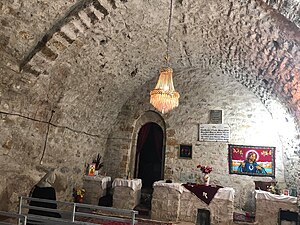Melian Islands: Difference between revisions
mNo edit summary |
|||
| Line 104: | Line 104: | ||
[[File:Mar Toma church urmia.jpg|thumb]] | [[File:Mar Toma church urmia.jpg|thumb]] | ||
====Language==== | ====Language==== | ||
The Melotic language is {{wp|Lemnian language|poorly classified and treated provisionally as an isolate}}, but has been influenced | The majority and first official language of the Melian Isles is {{wp|Greek language|Istroyan}}. Each island is regarded as having its own subdialect of Melian Istroyan, which in general differs from other Istroyan dialects due to linguistic drift and the influence of other languages, particularly Audonian and Coscivian languages. | ||
The Eteo-Melotic language spoken in [area of one island] is {{wp|Lemnian language|poorly classified and treated provisionally as an isolate}}, but has been influenced by Koiné Istroyan, Romance languages, Histan, and latterly by Coscivian. Despite its obscurity and numerically small speech community, Eteo-Melotic has a literary corpus of considerable size and age. | |||
===General culture and demographics=== | ===General culture and demographics=== | ||
Revision as of 15:30, 6 February 2023
| Melian Archipelagic Republic Πολιτεία Μηλίου Αρχιπελᾰ́γους (Istroyan) Kéarita Meliax Èsoxorosk (Kiravic) | |
 Flag | |
| Country | |
| Theme | |
| Capital | Thucydia (Thukōdisar) |
| Largest City | Philadelphia (Filadelfia) |
| Population | 9,724,599 |
| Prime Executive | Ansgar Þerōsdur |
| President | Isàm Źangarides |
| Stanora seats | 4 |
| Official languages | Istroyan Eteo-Melotic Coscivian |
| Postal Abbreviation | MLE |
The Melian Archipelago (Melotic: Mêlūssoé Hīrianžoé Yaššukotànaī Coscivian: Meliax Èsoxorokéarita), officially the Protectorate of the Seven Churches and more commonly known as the Melian Islands, is a constituent country and federated state of the Kiravian Federacy situated between the Sea of Canete and Sea of Istroya.
History
Ancient History
Early Christianity
Mediæval Era and Crusades
The Melian Islands were taken by the Oduniyyad Caliphate in 728, kicking off a century of large-scale invasions into eastern Sarpedon, followed by subsequent campaigns by individual adventurers to establish their own Caliphate-tributary realms on Sarpedonian mainland. The collapsing authority of Caphiria during this period made the continent especially vulnerable. Due to the strategic location of the islands in the Sea of Istroya and prevailing winds, Caliphal campaigns were waged with relative logistic ease. By the middle of the 11th century, the entire ancient Istroyan world and eastern Sarpedon had been conquered by the Caliphate. The dynastic feuding and civil wars of the Caliphate beginning in the 11th century lead to the destruction of Christian holy sites in the Melian Islands, enraging the Christian world and leading to social and political calls for retaliation.
Crusaders managed to capture the archipelago during the Third Crusade.
Kiravian Suzerainty
Post-Restoration
Geography

The archipelago has a tropical climate with strong oceanic influences overall, with more varied and typically cooler climates created by functions of altitude and local wind patterns shaped by the islands' mountainous topography. The five major islands are: Ketrya (home to the capital, Thucydia), Astándra, Dúkonia, and Vìor.
Politics
| Member | Party | First Elected | |
|---|---|---|---|
| Attikos Gelikopterys | Christian Civic Party (CSU) | 21189 | |
| Avigdor Vanalasial | Christian Civic Party (CSU) | 21192 | |
| Theophanws Katsiyan | Melian Democratic Party (RKC) | 21189 | |
| Epaphras Arximeden | New Democratic Party (SRA) | 21209 | |
The Melian Archipelagic Republic is operates under a semi-presidential system in which executive power is exercised by a cabinet (the Ārkakirstuv, 'State Council') which is accountable to both a governor-president (the Vèurovektur, 'Prime Executive') and to the legislature. The legislature elects the prime minister (confusingly titled the Anosalur, 'President'). The Prime Executive may veto legislation,...defence/policing/emergency management, appoint judges, prerogative powers, signs State Council orders. The Prime Executive is elected every six years and may not serve two consecutive terms or more than three non-consecutive terms.
The legislature, known as the Melian Congress, is elected every three years by instant runoff vote. Each county is accorded a minimum of two seats in the legislature, one "open" (contestable by party nominees and independents) and one reserved for independent candidates. Additional open seats may be allocated to counties after each census based on their deviation from the mean county population. Candidates standing for the reserved-independent seats campaign using public funds according to the Báltagren System.
The main political parties in the Melian Isles are the Χ Party, Υ Party, and Ζ Party.
Law
Society & Culture
Ancestry
Religion
Before the arrival of Christianity, the predominant worldview on the islands was Pythagoreanism.

Language
The majority and first official language of the Melian Isles is Istroyan. Each island is regarded as having its own subdialect of Melian Istroyan, which in general differs from other Istroyan dialects due to linguistic drift and the influence of other languages, particularly Audonian and Coscivian languages.
The Eteo-Melotic language spoken in [area of one island] is poorly classified and treated provisionally as an isolate, but has been influenced by Koiné Istroyan, Romance languages, Histan, and latterly by Coscivian. Despite its obscurity and numerically small speech community, Eteo-Melotic has a literary corpus of considerable size and age.
General culture and demographics
The people of the Melians are predominantly apostolic Christians, with some of the earliest known Christian congregations having been planted there by the Apostles.
Economy
The Melians have long been an important trading centre, owing to their position between the Sea of Istroya and Sea of Canete. The Melians were involved in intercontinental commerce between Levantia and Sarpedon for many centuries, and later became an important entrepôt as trade opened up between the Occident and Audonia-Punth-Alshar. Commerce and transportation remain crucial sectors for the islands' economy today.
The agricultural sector accounts for a large percentage of the territory's GDP. Melian agriculture measures up to that of the breadbasket states of the Kiravian island continent in efficiency and productivity, aided by advanced mechanisation, biotechnology, and agronomic knowledge. Coffee production in the Melian Isles provides the territory with its most valuable agricultural export. Other tropical produce such as breadfruit, palm oil, pepper, cloves, cacao, mangoes, eddoes, bananas, and dragonfruit are grown as well.
A major contributor to the Melian economy is the Jade Coast Spaceport, owned and operated by the Federal Spaceflight Authority. The spaceport is located on a large tract of land in County Seraïkan on the northeast coast of Astándra Island, and includes five launch sites for unmanned rockets and two for reusable manned spacecraft, which take advantage of the archipelago's position close to the equator to minimise the amount of energy required to enter orbit. It is currently the leading Kiravian spaceport for commercial sattelite launches and for manned space missions, especially logistical support for the FSA space station Starfield, though concerns about possible Santherese surveillance have prompted the FSA to move more sensitive launches to other locations. The Jade Coast Spaceport is the largest single employer in the islands after the territorial government, and has drawn many highly-educated, high-income workers to Astándra Island.
More conventional, sub-orbital transportation is also important to the Melian economy. The islands are an important way station between Great Kirav and the Sydona Islands, and between the Sydonas and Kiravian Punth. Melian members of the Federal Stanora have pushed for closer trade relations between the Federacy and Pukhtunkhwa, from which their territory would be geographically well-poised to benefit from.
A tourist industry catering mostly to Levantine visitors and Kiravian hikers and scuba divers is a key source of growth for the service sector, underpinning the economy of numerous coastal communities located near well-maintained beaches and reefs.
Valuable nickel deposits on Ketrya Island are expected to enter production in 21209.
Notable Melians
- Pharides of Zukharno - Ancient political philosopher known for his works on human nature, warfare, and the state. Citizen of the ancient Melian city-state of Zukharno, now the town of Súxarnon in County Thalen.
- Daron Ladaxēva - Chess grandmaster and reigning national champion.
- Alphegos Kassenin - Eminent mathematician and physicist, known for his role in the Kiravian Federacy's nuclear weapons program. Born and raised in Mirśamur.
- Ansgar Therōsdur - Xth Governor of the Melian Isles, born in Intravia, but a resident of Thucydia for over a decade.
- Biggus McDickus - Senior naval officer, born in Mirśamur.